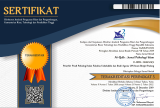Tumbuh Bersama Saudara Kandung Autism Spectrum Disorder (ASD) : Pemaknaan Sibling Relationship Pada Remaja
Abstract
Abstract: Sibling relationships will be unique case when it terms of the perspective of adolescents who have siblings with Autism Spectrum Disorder (ASD). The inability of Autism Spectrum Disorder (ASD) children in building social interaction and communication with the surrounding environment, can affect social development in adolescents. This study aims to explore the meaning of sibling relationships in adolescents who have siblings with Autism Spectrum Disorder (ASD) and the dynamics of the emergence of these meanings. This study used qualitative method with a phenomenological approach. The main participants in this study amounted with three people. Data collection uses in-depth interviewing techniques and documentation. The results of this study indicate that adolescents who have siblings with Autism Spectrum Disorder (ASD) interpret sibling relationships as a gift from God, which aims to change their thinking, emotional conditions and behavior to become more mature. In addition, the quality of sibling relationships that are owned can be influenced by life values such as religious values and moral values related to harmony in family relationships.
Keywords
Full Text:
PDF (Bahasa Indonesia)References
Angell, Meadan, Stoner (2012). Experiences of siblings of individuals with autism spectrum disorders. Department of Special Education USA. 10(12), 495-506.
Benson, P., & Karlof, K. (2008). Child, parent, and family predictors of latter adjustment in siblings of children with autism. Research in Autism Spectrum Disorders, 2(1), 583–600.
Binyamini, I., & Ajaj, O. (2012). Coping of siblings of children with developmental disabilities in the bedouin community. Research in Developmental Disabilities, 33(2), 825-831.
Buist, K. L., Maja, D., & Peter, P. (2012). Sibling relationship quality and psychopathology of children and adolescents: A meta-analysis. Clinical Psychology Review,33(1), 97- 106.
Creswell, J.W. (2015). Penelitian kualitatif & desain riset: Memilih diantara lima pendekatan. (A.L. Lazuardi, Trans.). Yogyakarta: Pustaka Pelajar.
De Caroli, M.E, & Elisabetta, S. (2013). Siblings and disability: A study on social attitudes toward disabled brothers and sisters. Procedia Social and Behavioral Science. 93(2013), 1217-1223.
Diener, M. (2014). Sibling relationships of children with autism spectrum disorder in the context of everyday life and a strength-based. Journal of Child and Family Studies. 24(4), 1060-1072
Hames, A., McCaffrey, M., & McCaffrey, B. (Ed). (2005). Special brothers and sisters: stories and tips for siblings of children with a disability or serious illness. London: Jessica Kingsley.
Hastings, R. P. (2003). Behavioral adjustment of siblings of children with autism engaged in applied behavior analysis early intervention program: The moderating role of social support. Journal of Autism and Developmental Disorders, 33(2), 141–150.
Hurlock, E.B. (2013). Perkembangan anak. Edisi Keenam. Jakarta: Erlangga
Mandleco, B., Olsen, S.F., Dyches, T., Marshall, E. (2003). The relationship between family and sibling functioning in families raising a child with a disability. Journal of Family Nursing, 9(4), 365-396.
Mangunsong, F. (2009). Psikologi dan pendidikan anak berkebutuhan khusus. Jilid Kesatu. Fakultas Psikologi. Universitas Indonesia. Depok: LPSP3.
Parritz, R.H., & Troy, M.F. (2014). Disorders of childhood: Development and psychopathology. second edition. Wadsorth: Cengage Learning.
Poerwandari, E.K. (2011). Pendekatan kualitatif untuk penelitian perilaku manusia. Depok: LPSP3 UI.
Santrock, John W. (2012). Life-span development. 13 th Edition. University of Texas, Dallas : Mc Graw-Hill
Steinberg, L. (2014). Adolescence 10th ed. New York: McGraw-Hill Companies, Inc.
Stoneman, Z. (2005). Siblings of children with disabilities: research themes. Journal of Mental Retardation, 43(5), 339-350.
Willig, C. (2008). Introducing qualitative research in psychology. New York: The McGraw Hill Companies
Refbacks
- There are currently no refbacks.
Ruang Jurnal,
Fakultas Ushuluddin dan Studi Agama,
UIN Imam Bonjol Padang
Jl. Mahmud Yunus No.6,Lubuk Lintah,
Kota Padang, Sumatra Barat
E-mail: jurnal-alqalb@uinib.ac.id

This work is licensed under a Creative Commons Attribution-ShareAlike 4.0 International License.



